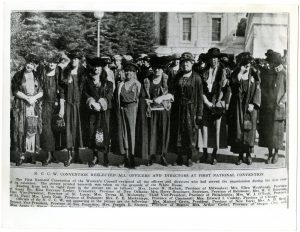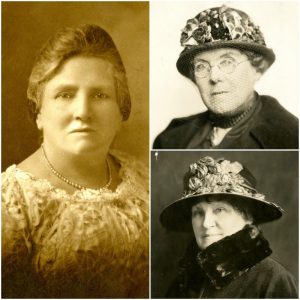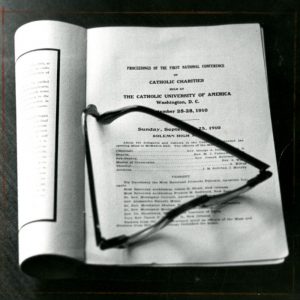This August will mark the one hundredth anniversary of the ratification of the Nineteenth Amendment, which states that no citizen of the United States shall be denied the right to vote “on account of sex.”

The history of women’s suffrage is closely allied with the abolitionist and the temperance movements of the early 19th century—antebellum struggles in which women figured prominently (especially women guided by religious principles). In the aftermath of the Civil War, women’s suffrage gained momentum, but its activists were divided among several rival organizations: most notably, the National Woman Suffrage Association (NWSA) and the American Woman Suffrage Association (AWSA). The 1890 founding of the National American Woman Suffrage Association (NAWSA) braided the NWSA and AWSA together—presenting a united front that propelled women’s rights agitation into a mass movement. Arguably, though, the more radical National Woman’s Party (NWP)—which was formed in 1916 and made the controversial decision to continue picketing the White House despite the war effort—played the decisive role in getting a constitutional amendment passed.
If the zeitgeist of the Progressive Era (1890-1920) was the coalescence of social, political, and economic reform movements into bureaucratic organizations, then women’s suffrage embodied it. Not coincidentally, many organizations of Catholic laywomen also trace their roots to the turn of the 20th century. The Catholic University of America (CUA) Archives is the official repository for several prominent organizations of Catholic laywomen, including the Christ Child Society (1887, chartered in 1903), the Daughters of Isabella (1897), the Catholic Daughters of the Americas (1903), the National Conference of Catholic Charities (1910), the International Federation of Catholic Alumnae (1914), and the National Council of Catholic Women (1920).

Although Christian goodwill informed much of the moral impetus behind reforms of the Progressive Era, that Christianity was often of a decidedly Protestant variety. The 19th and early 20th centuries were marked by fierce prejudice against Catholics, which was only exacerbated by the dramatic uptick in Irish, Italian, and Polish immigrants in the 1890s. The upshot: Catholics mirrored the wider trends of the Progressive Era in their own sphere.
The Catholic University of America (CUA) has direct ties to three of the above-listed organizations of Catholic laywomen. Brief overviews follow in chronological order.

The National Conference of Catholic Charities—today’s Catholic Charities USA—was founded on the campus of Catholic University in 1910. As Dr. Maria Mazzenga, Curator of the American Catholic History Research Center, notes in this 2017 blog post, “Catholic laywomen dominated the early membership.”
The International Federation of Catholic Alumnae (IFCA), founded in 1914, was headquartered in Washington, D.C. on the campus of CUA until the 1960s. Upon the completion of the IFCA finding aid in 2013, University Archivist and Head of Special Collections W. J. Shepherd explained IFCA’s “deep connections to Catholic University as benefactors”—most notably through the endowment of the St. Elizabeth Ann Seton Chair in Education.
Meanwhile, the National Council of Catholic Women (NCCW) ran the National Catholic School of Social Service between 1921 and 1947—a women’s school which was officially folded into the men’s school at CUA after many years of parallel association. As we commemorate the centenary of women winning the vote, the NCCW, established in 1920, is also celebrating its one hundredth anniversary.
For more on Catholic women, please see the research guide Special Collections — Catholic Women Resources.
